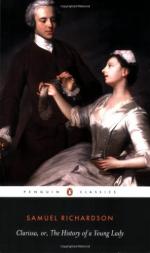I am very desirous to see what she has written to her sister; what she is about to write to Miss Howe; and what return she will have from the Harlowe-Arabella. Canst thou not form some scheme to come at the copies of these letters, or the substance of them at least, and of that of her other correspondencies? Mrs. Lovick, thou seemest to say, is a pious woman. The lady, having given such a particular history of herself, will acquaint her with every thing. And art thou not about to reform!—Won’t this consent of minds between thee and the widow, [what age is she, Jack? the devil never trumpt up a friendship between a man and a woman, of any thing like years, which did not end in matrimony, or in the ruin of their morals!] Won’t it strike out an intimacy between ye, that may enable thee to gratify me in this particular? A proselyte, I can tell thee, has great influence upon your good people: such a one is a saint of their own creation: and they will water, and cultivate, and cherish him, as a plant of their own raising: and this from a pride truly spiritual!
One of my lovers in Paris was a devotee. She took great pains to convert me. I gave way to her kind endeavours for the good of my soul. She thought it a point gained to make me profess some religion. The catholic has its conveniencies. I permitted her to bring a father to me. My reformation went on swimmingly. The father had hopes of me: he applauded her zeal: so did I. And how dost thou think it ended?—Not a girl in England, reading thus far, but would guess!—In a word, very happily: for she not only brought me a father, but made me one: and then, being satisfied with each other’s conversation, we took different routes: she into Navarre; I into Italy: both well inclined to propagate the good lessons in which we had so well instructed each other.
But to return. One consolation arises to me, from the pretty regrets which this admirable creature seems to have in indulging reflections on the people’s wedding-day.—I once!—thou makest her break off with saying.
She once! What—O Belford! why didst thou not urge her to explain what she once hoped?
What once a woman hopes, in love matters, she always hopes, while there is room for hope: And are we not both single? Can she be any man’s but mine? Will I be any woman’s but her’s?
I never will! I never can!—and I tell thee, that I am every day, every hour, more and more in love with her: and, at this instant, have a more vehement passion for her than ever I had in my life!—and that with views absolutely honourable, in her own sense of the word: nor have I varied, so much as in wish, for this week past; firmly fixed, and wrought into my very nature, as the life of honour, or of generous confidence in me, was, in preference to the life of doubt and distrust. That must be a life of doubt and distrust, surely, where the woman confides nothing, and ties up a man for his good behaviour for life, taking church-and-state sanctions in aid of the obligation she imposes upon him.




